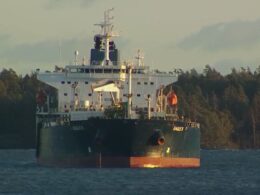Western shipowners have earned over $6 billion by selling aging oil tankers that are now being used to transport Russian oil and circumvent sanctions amid the war, according to an investigation by Follow the Money in collaboration with 13 other newsrooms and 40 journalists from around the world,
The shadow fleet emerged as a response to Western sanctions aimed at limiting Russia's ability to export oil that maintains revenue streams crucial for financing military activities against Ukraine.
The investigation found that more than 230 vessels previously owned by Western companies—representing over a third of Russia's shadow fleet—were sold at premium prices to entities that now use them to transport Russian oil above the G7-imposed price cap, according to Follow the Money.
The European Union banned direct vessel sales to Russian companies in late 2023, but the shadow fleet continues to operate through companies registered in countries like India, the Seychelles, Hong Kong, and Vietnam.
Greek shipowners dominated these sales, followed by British and German owners.
Paris Kassidokostas-Latsis, a Greek shipping magnate, exemplifies how Western business owners have profited from selling vessels that now transport Russian oil.
His company, Marla Tankers, sold two oil tankers for $84 million in late 2024, having purchased them for less than 50 million dollars six years earlier.
The vessels, previously named Fos Picasso and Fos Da Vinci, were sold to Vietnam-based Phuong Dong Petrol Transportation, a company already involved in Russia's shadow fleet operations. According to Bloomberg Terminal data, within a month of the sale, both 250-meter tankers were loading Russian oil at the Baltic port of Ust-Luga, each carrying cargo worth approximately $50 million.
Kassidokostas-Latsis, a 42-year-old film producer known for his connections to both Hollywood and the maritime industry, did not respond to Follow the Money's requests for comment. Similarly, the Vietnamese buyer declined to comment on the transaction.
The Kyiv School of Economics estimates that over 600 tankers now comprise this shadow fleet and handle 70% of Russian oil exports, contributing to Russia's reported €800 billion in fossil fuel revenue since the start of the war.
While some companies maintain they couldn't have known their vessels' ultimate use, industry experts disagree. The motivation was clear: aging tankers suddenly doubled in value due to Russian demand.
"Everybody with an old ship in Europe sold it and it ended up in Russian trading," Lloyd's List analyst Michelle Wiese Bockmann told Follow the Money. "It would have been impossible not to know the ultimate fate of that vessel."
Bockmann noted that virtually all tankers over 15 years old ended up in Russian trading at prices significantly higher than pre-invasion levels.
Western governments are intensifying efforts to curtail Russia's shadow fleet of oil tankers, with over 300 vessels now under sanctions. The US leads these efforts with 235 sanctioned vessels, including 155 added during the Biden administration's final days, while the EU has sanctioned 68 tankers.
The crackdown stems from dual concerns: enforcing the G7 price cap on Russian oil and preventing potential environmental disasters from aging, underinsured vessels.
According to EU sanctions envoy David O'Sullivan, European shipowners must now report vessel sales to third countries and verify that their ships don't undercut sanctions.
However, Follow the Money identified at least 32 European-owned tankers sold to the shadow fleet after these rules took effect. A ship broker, speaking anonymously to Follow the Money, explained the motivation:
"An investor is only interested in one thing, and that is money. I think the ethical line is very thin. If it's allowed, they'll do it."
The investigation revealed that Greek shipowners sold vessels worth almost $4 billion, while UK-based companies earned $590 million from selling 22 tankers, and German shipowners received $190 million from their sales.
Related:
- Barbados and Panama to remove flags from 114 Russian shadow fleet tankers
- Russian shadow fleet’s Eagle S remains under arrest as damage claims mount
- YLE: Dubai firms own 55 vessels in Russian shadow fleet
- US, UK block Russia’s oil giants in largest-ever energy sanctions package, target shadow fleet
- German FM calls for more Russian shadow fleet sanctions after Baltic cable damage





